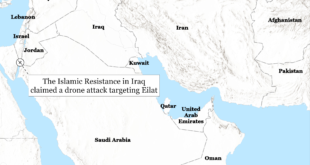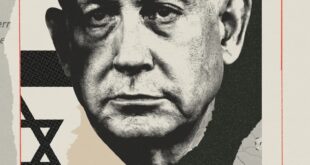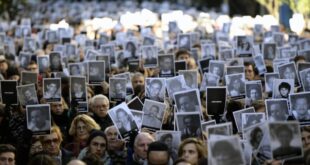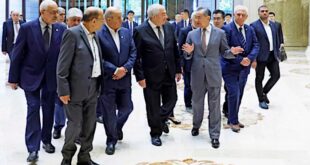 A convoy of US vehicles from Kuwait arrives Monday in Basra, 550km south of Baghdad. The first additional US troops, who will take part in a major new security plan in Baghdad, arrived in Baghdad, General George Casey, the US commander in Iraq, said (Reuters photo by Atef Hassan)BAGHDAD (AP) — Prime Minister Nouri Maliki’s attempt to close a chapter in Saddam Hussein’s quarter-century in power — by hanging two of his aides Monday — further enraged Sunnis when the former leader’s half-brother was decapitated on the gallows.
A convoy of US vehicles from Kuwait arrives Monday in Basra, 550km south of Baghdad. The first additional US troops, who will take part in a major new security plan in Baghdad, arrived in Baghdad, General George Casey, the US commander in Iraq, said (Reuters photo by Atef Hassan)BAGHDAD (AP) — Prime Minister Nouri Maliki’s attempt to close a chapter in Saddam Hussein’s quarter-century in power — by hanging two of his aides Monday — further enraged Sunnis when the former leader’s half-brother was decapitated on the gallows.
Barzan Ibrahim’s stout body plunged through the trap door and its head was snapped off by the jerk of the thick beige rope at the end of his fall towards the execution chamber floor six metres below.
A government video of the execution screened for reporters showed Ibrahim’s body passing the camera in a blur, after the decapitation. His body came to rest on its chest, with the head a few meters away, still covered in the black hood that was put there by one of his five masked executioners only moments before.
Awad Hamed Bandar, head of Saddam’s revolutionary court, swung lifeless at the end of the rope that hanged him. Both men met death at 3:00am wearing red jumpsuits that designated them as condemned men.
Prosecutor Jaafar Moussawi, who witnessed the hangings, said Ibrahim looked tense when he was brought into the chamber. He quoted him as saying, “I did not do anything. It was all the work of Fadel Barrak,” a reference to the man who ran two intelligence departments in Saddam’s feared mukhabarat.
They were taken to the gallows two weeks and two days after Saddam was hanged in a pitiless execution. All three hangings occurred in a Saddam-era military intelligence headquarters building in the Shiite north Baghdad neighbourhood of Kazimiyah.
By day’s end at least 3,000 angry Sunnis, many firing guns in the air, others weeping or cursing the government, assembled in Ouja for the burial of Ibrahim, who also served as Saddam’s intelligence chief, and Bandar.
“Where are those who cry out in demands for human rights?” Marwan Mohammad, one of the mourners, asked in grief and frustration.
“Where are the UN and the world’s human rights organisations? Barzan had cancer. They treated him only to keep him alive long enough to kill him. We vow to take revenge, even if it takes years.” Ibrahim’s son-in-law, Azzam Saleh Abdullah, said “we heard the news from the media. We were supposed to be informed a day earlier, but it seems that this government does not know the rules.” He said it reflected the hatred for Sunnis felt by the Shiite-led government. “They still want more Iraqi bloodshed. To hell with this democracy,” he said.
The executed men, at their request, were buried in a garden outside a building Saddam had built for religious events in the town of his birth and in which the former leader was interred on New Year’s Eve in a grave chipped out of an interior floor.
Ouja, just outside Tikrit — the former leader’s Tigris River power base about a 90-minute drive north of Baghdad — witnessed not only Saddam’s birth and burial, but was the scene of his December 2003 capture by American soldiers.
They found him hiding in a tiny underground bunker near the town nine months after he fled the blitzkrieg US-led invasion from Kuwait toppled his regime.
Saddam, Ibrahim and Bandar were sentence to hang after they were found guilty of crimes against humanity for the killings of 148 Shiites after a failed 1982 assassination attempt against the former leader in the city of Dujail.
Saddam was executed four days after the appeals court upheld the verdicts, reportedly under pressure from Maliki who wanted the former leader dead before 2006 was out.
The execution video shown to reporters Monday, an obvious attempt to prove that Ibrahim’s body was not intentionally mutilated after death, was muted as was the official video of Saddam’s execution.
The Saddam execution pictures were broadcast by television outlets worldwide. But Ali Dabbagh, the government spokesman, said there would be no public distribution of the video of Monday’s hangings.
“We will not release the video, but we want to show the truth,” he said. “The Iraqi government acted in a neutral way.” “No one shouted slogans or said anything that would taint the execution. None of those charged were insulted,” the spokesman said.
The official video of Saddam’s hanging was quickly pushed aside by a second one taken with a cellphone camera by a witnesses and leaked to Arab television stations and Internet websites. It showed the gallows floor opening, Saddam falling and swinging dead at the end of the rope.
But before he died, some of those in attendance could be heard chanting “Moqtada, Moqtada,” the given name of a radical Shiite cleric whose Mehdi Army is believed responsible for the deaths of thousands of Sunnis in the past year.
The unruly scene drew worldwide protest and calls for Ibrahim and Bandar to be spared the hangman.
Last week, Iraqi President Jalal Talabani urged the government to delay the executions.
“In my opinion we should wait,” Talabani said Wednesday at a news conference with US Ambassador to Iraq Zalmay Khalilzad. “We should examine the situation,” he said without elaborating. A spokeswoman for UN Secretary General Ban Ki-moon said he “regrets that despite pleas from both himself and the high commissioner for human rights to spare the lives of the two defendants, they were both executed.” A lawyer for the two men told the Associated Press recently that they were taken from their cells and told they were going to be hanged on the same day Saddam was executed.
Issam Ghazawi, a member of Saddam’s defense team, said he met individually with Ibrahim and Bandar and that Ibrahim told him they were escorted from their cells and told they were also going to be executed.
He said the two men were also told to write their wills, but were taken back to their prison cells nearly nine hours later.
After Saddam’s execution, Human Rights Watch released a report calling the speedy trial and subsequent hanging of Saddam proof of the new Iraqi government’s disregard for human rights.
“The tribunal repeatedly showed its disregard for the fundamental due process rights of all of the defendants,” said Richard Dicker, director of Human Rights Watch’s International Justice Programme.
On Monday, Secretary of State Condoleezza Rice said the executions were mishandled and said she hoped that those responsible for making cell phone videos of Saddam’s execution would be punished.
“We were disappointed there was not greater dignity given to the accused under these circumstances,” Rice said during a news conference with her Egyptian counterpart in Luxor, Egypt.
Across Iraq on Monday, authorities reported at least 55 people were killed or found dead, and the US military announced the deaths of two more soldiers, both killed in Baghdad.
 Eurasia Press & News
Eurasia Press & News



